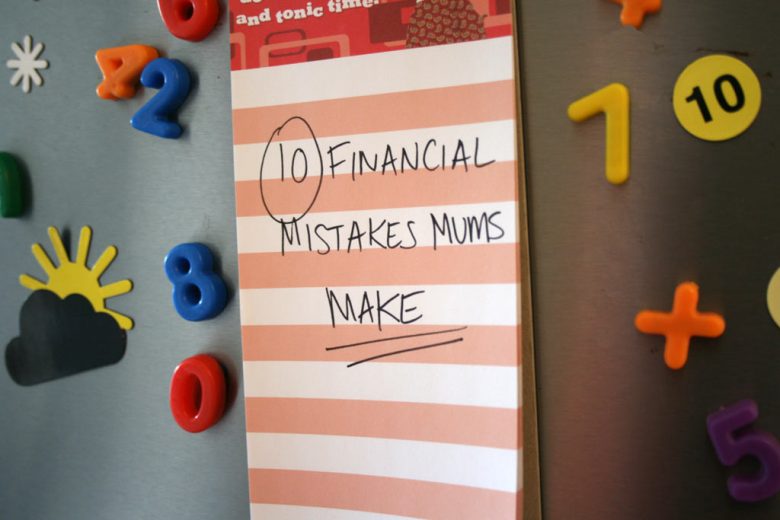10 financial mistakes mums can make (and how to avoid them)
No one likes to make mistakes. But when money is involved, errors can be costly and have far-reaching consequences.
To help keep your savings safe, we highlight the 10 most common financial mistakes made by mums, and how we can avoid them.
All too often we don’t even know we’ve made a mistake until it’s too late, and we’re counting the cost. Or we heed an expensive lesson learned by our family or friends, and take action to avoid the same penalty happening to us. But wouldn’t it be great if we could prevent us, and those close to us, from making these mistakes in the first place?
To help keep your money safe, financial planner Rebecca Robertson explains the 10 most common mistakes mums can make, and how you can avoid them.
10 financial mistakes mums make
Read on to learn some of the most common issues my clients deal with – and how you can avoid making the same (potentially expensive) mistakes.
1) Letting your partner deal with your finances
As much as I love my husband, and we have a strong partnership, I wouldn’t let him decide on the colour of the walls – let alone leave him solely in charge of all the family financial decisions. He would be making choices that would affect me and our children, and I wouldn’t have any knowledge of them, let alone any say in them.
So often, wives and partners that have become widowed or divorced find themselves in a difficult position because they don’t understand, or are unhappy with, the lack of provisions made for them. And you don’t even have to be separated to be affected by your partner’s financial choices.
What if they make poor investment choices, or aren’t ensuring they’re getting the best deals? They could be squandering yours and your children’s security while you remain blissfully ignorant.
So don’t wait until you’re left struggling to pay the bills. If you’re not already actively involved in your family’s finances, start now. Ask your partner how much money you have, and where it is. Question choices they’re making and ensure your financial future is secure.
2) Not reviewing your finances after a change in circumstances
Becoming a mum is a life-changing experience in many senses – including financially. In the past you may have taken financial advice and taken out products to protect yourself. But as your circumstances change, so should your financial planning.
Many mums are brilliant at hunting down discount deals and ways to ensure our funds go further on a daily basis, but we don’t always make the time to consider the bigger picture. So if you haven’t reviewed your financial circumstances lately, it may be a good idea to do so now. Either by researching yourself online or, even better, getting help from an independent adviser.
Some time spent checking you have everything adequately covered now (and you’re not paying out on policies that are no longer relevant) could save you pounds in the long term.
3) Not writing a Will
As many as one in three people in the UK die without a Will*. And as we don’t like to contemplate our mortality, ensuring that we leave clear, legal instructions for our finances and assets after our death is vital – especially if we have children who are dependent on us.
If you do die intestate (without a Will) then the state will take charge of your estate and distribute it according to strict guidelines. If you live in England or Wales and are married or in a civil partnership, your surviving partner will receive your entire estate – as long as it is worth less than £250,000, including the value of any property.
If your estate is worth more, your partner will get the first £250,000 (plus a ‘life interest’ in half of the rest), and the balance will be shared by your children. And if you’re not married or in a civil partnership, your estate will be shared among your children.
So if you haven’t already done so, it’s a really good idea to make plans write a Will now – not only will you ensure your money and personal items go to the people you want them to, but you could spare your family any unnecessary extra stress and heartache. You’ll find some helpful information on writing a Will and Inheritance Tax here.
4) Not setting up guardianship for your children
While we’re on the dark subject of death, it seems the right moment to ask you another important question. Who will look after your children if you die? It may not be the most pleasant topic to consider, but when you have children who depend on you, it’s an important subject to address.
If the unthinkable does happen and you don’t have any guardianship agreed and legally established (a situation that happens sadly too often), your children could be taken into care while social services or the courts decide who is fit to care for them.
So if you haven’t done so already, think carefully about who you would entrust your children to – and make sure they’re happy to care for them should anything happen to you. Then write your wishes into your Will. This website contains lots more helpful advice on the roles and responsibilities of guardians, and how to choose them.
5) Not setting up your own pension
Women usually take more and longer career breaks than men, often work part time and, increasingly, are becoming self-employed. If you still have an old pension from previous employment, it’s worth reviewing it to make sure it’s achieving the best return.
It’s understandable that investing in a pension falls down the list of priorities for most mums existing on the frontline of childcare – when you’re consumed on a daily basis with packed lunches, homework, washing, and housework (and that’s without your own work) your own needs for later life don’t seem pressing enough to squeeze into your schedule.
But if you don’t plan now, how will you fund your retirement years? And if you can’t take care of yourself when you’re older, who will? Your family? The state? If you’d like more choice and freedom when you’re older, it’s a good idea to invest time, thought and money in it now.
6) Spending all your money on your children
Between soaring childcare costs, ever-lengthening school uniform lists and the general rising costs of living, there are enough essential expenses in raising kids without adding to the bill with unnecessary purchases.
We’ve all heard of the phrase ‘pester power’ and you wouldn’t be human if you’ve not given into it at least once just for an easy life (or a quiet five minutes). But the occasional treat soon adds up, and over a year can come to a considerable sum. So, unless you have a bottomless fund to spend from, think carefully before you give into every demand.
It’s much easier than you think (and even fun) to take a step back from compulsive consumerism and teach your children the joys they can find in a simpler life. If you’re looking for inspiration and ideas, just read the experiences of this mum who decided to try to raise her son without spending money.
7) Not thinking it’s worthwhile
Many mothers believe that they don’t have any money, or a limited future earning capacity, so why bother doing anything with it? But there’s never a good excuse for not making wise financial decisions.
Despite what you may think, you don’t need to be a millionaire to make money by saving. Investing little and often can have a big impact on your long term returns. As can making really wise decisions about what to spend money on, and where to cut back.
So even if you feel despondent that your finances are in a terrible state, don’t give up. Every decision you make and pound wisely invested now has the potential to make a big difference in your life in the long term. With good advice and determination, you still have plenty of time to save for a more prosperous future. (Especially if you avoid mistake number six and save some of the pennies and pounds you would have spent on your kids!)
8) Following DIY online financial advice
As brilliant as the internet is for getting the answers to practically everything and sniffing out the best deals, when it comes to your family finances, it’s not the best place to seek advice.
By all means keep up to date with financial news and research the best products, but it’s always best to get professional advice before you part with your hard-earned cash. The difference between a great financial investment and a poor one over time can be huge – and it’s too late to realise you made a poor call or missed out on a tax break years down the line when you’re several thousand pounds worse off.
So, if you’re making big financial decisions, make sure you get personal advice from a qualified financial advisor (like those at perks.com.au and similar other services) who can provide you with full advice and recommendations.
9) Getting advice from the wrong person
For many of us, planning our finances is a headache. We know it’s important, but it’s way out of our comfort zone and regulation just makes it even more complicated. So we do something quite logical and turn to the people we trust, such as banks or brokers recommended by family or friends.
Except that’s not always the best choice. Finding the right financial advisor is such an important decision and you need to make sure you ask the right questions before trusting someone with your life savings – questions like whether they’re whole of market (meaning they have access to all financial products available), work from a limited panel of providers, or are tied to just one provider.
It’s also a good idea to compare the fees charged and service provided. So you can be confident that your advisor is giving you unbiased advice based on the widest number of options, and isn’t overcharging for their services.
10) Not having adequate protection in place
For many of us, life cover is a basic financial protection – especially if we have a mortgage. But there are lots of other types of products that can help us.
Life cover is usually the first choice for clients, however there are many other considerations. In fact, recent research shows that two fifths of parents have no life income protection or critical illness insurance, and with the rising cost of living (including childcare) simply crossing your fingers and hoping nothing happens to you or your partner is a risky, and potentially expensive, gamble to make.
Some families aren’t even aware that they don’t have cover. They may assume that a basic policy they took out for their mortgage offers more protection than it actually does, or not even have considered the idea that they may wish to protect their lifestyle.
So unless you’re 100% confident that you and your family are adequately covered, it’s a good idea to check any policies you do have, and research what else is available. It doesn’t even have to be expensive – according to experts, people pay an average of £27 a month for protection policies.
* Source: Which Money










